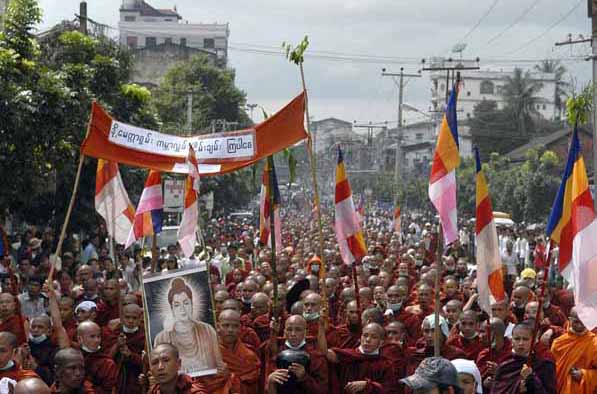Can the Opposition Remain Relevant?

Media access also plays a crucial role in strengthening the leverage of the opposition groups. Although Burma’s domestic media is subject to severe news blackouts and censorship, the people of Burma listen to foreign short-wave radio stations, upon which they rely heavily for information.
In the run-up to the 1988 uprising, the Burmese-language radio services of the BBC and VOA played a critical role, virtually coordinating public protests by disseminating information about the riot police’s brutality against students and the country’s economic crisis. In the 2007 Saffron Revolution, the protesters had the advantage of significantly increased media access and information technology, and thereby managed to broaden the protests. When the regime cracked down on the Buddhist monk-led protests, the pictures and video footage of the marching and killing were sent to the outside world via the Internet, increasing the protesters’ leverage both at the time and for the future.
In contrast, one way in which opposition activists lose leverage is by focusing too much on their own political demands—such as the transfer of power to the NLD due to its victory in the 1990 election—or on political dialogue that is not perceived to be directly related to the people’s daily struggle for survival. When the opposition becomes self-centered, leverage is diminished because the public becomes indifferent to politics and leaves the activists on their own to achieve their personal political demands.
Endgame Strategy
One of the crucial reasons the 8-8-88 mass uprising failed was that the opposition did not provide the strategic leadership necessary to achieve the endgame of regime change. When the street protests reached their peak in late August through September 18, government mechanisms collapsed. However, the opposition leaders did not unify and either create or seize the opportunity for regime change or negotiated transition in the power vacuum.
Burma’s opposition leadership has always been enthusiastic when it comes to mobilizing mass movements, but has failed to capitalize and achieve the intended results when protests have reached their crescendo. In other words, the opposition always tries hard to achieve the means (instigating a mass movement) as if that is the end in itself.
While public pressure alone can challenge the status quo, whether a public movement leads to a genuine political transition depends on whether the opposition employs an effective endgame strategy. Of course, mass movements will remain the sine qua non for Burma’s opposition so long as the intransigent regime refuses to initiate inclusive political reform.
In summary, the question of relevancy for Burmese opposition groups must be viewed from two perspectives: their legitimacy and the outcome of their effort. At this time, it appears that while the opposition groups will remain relevant in terms of public support and legitimacy, they will have to improve their performance with respect to their ability to maintain resilience, obtain leverage and formulate effective endgame strategies.
This will require opposition groups to diversify their repertoire, adopt tactical innovations, persuade influential third parties to support their cause, broaden their social base and balance between a principle-based and an interest-based approach. If able to do so, they will not only increase the likelihood of accomplishing their goals, they will increase their relevance far beyond their current moral legitimacy.
Hindsight might not be merciful, but it helps break the cycle of repeating the same thing over and over while expecting different results. Moreover, it helps in the process of exiting the mindset of nostalgia and entering the forward-looking strategic realm, which is exactly what the generation that lead Burma’s 1988 popular movement must do to make themselves relevant in the country’s current political landscape.
« previous 1 | 2 | 3 |
